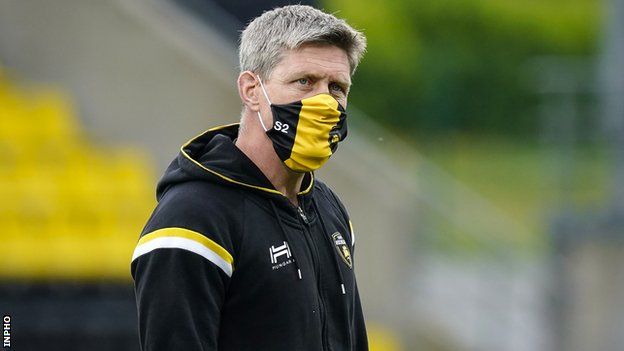Ronan O'Gara: La Rochelle head coach on the power of positivity and a 'no limits' approach
- Published

O'Gara's La Rochelle will host his old rivals Leinster in a Champions Cup semi-final on Sunday
Heineken Champions Cup: La Rochelle v Leinster |
|---|
Venue: Stade Marcel-Deflandre, La Rochelle Date: Sunday, 2 May Kick-off: 15:00 BST |
Coverage: Live text commentary on BBC Sport website and app |
Ronan O'Gara does not have much time for clichés.
It is one area in which O'Gara the player and O'Gara the coach would definitely have seen eye-to-eye.
A changing room full of ill-considered platitudes still leaves Ireland's second most-capped international as cold now as it did when he was at the peak of his playing powers.
Perhaps now though, O'Gara's disdain for "fake positivity" is a more considered position than it ever was while he was playing.
Fake positivity, says La Rochelle's head coach, serves only to deter players from buying into the environment he is desperate to create.
A positive environment is the cornerstone, a non-negotiable, of O'Gara's coaching identity. To understand why, you have to go back to the Corkman's time as attack coach at New Zealand Super Rugby side Crusaders.
"Crusaders is a fantastic environment that nearly runs itself because of the fantastic people. It isn't the building, it's the people. You're as good as the people you surround yourself with. A building doesn't have ideas, people have ideas," he says.
"The negative burden chirping at me on my shoulder when I started off at the Crusaders was saying 'this isn't going to last, this can't happen'.
"But give it a chance. Give it a go and actually embrace it, you'd be surprised or even overwhelmed like I was at what 60 positive, decent, authentic people buying into something can produce."
O'Gara's two years with Crusaders were immensely formative in the establishment of his own coaching principles. To this day, it remains his key reference point.
The desire is to integrate, not replicate. O'Gara is clear that what worked in Christchurch will never work in the west of France.
"There are different skills. In the Crusaders the skills of the front five were very, very high. In France, in the past there may have not been an environment where you encouraged your front five players to pass and play with the ball," he says.
"For me that's non-negotiable, they have to be confident. But if they've been told in the past just to clean rucks and push in the scrum, I don't know how enjoyable their daily work was going to be.
"For me when I came in it was like, OK, everyone has to be able to back left-to-right and right-to-left, we've got to practise and train it but you've got to be considerate to them.
"If they're trying a new technique and the ball goes to the ground that's OK. It's a skills error, it's not an error with attitude, they just haven't been used to it."
La Rochelle are into the Champions Cup semi-finals and sit second in France's Top 14
So far, the head coach's methods are striking a chord. La Rochelle are fighting for silverware both domestically and in Europe, something even O'Gara did not believe would happen as quickly as it has.
The primary target is to create a culture, not just one of performances and results, but one where every player regardless of experience or standing feels empowered to contribute to the direction of the club.
"Once a player's opinion is valued and respected and he has a platform where he can speak openly, that can accelerate another discussion and all of a sudden 40 minutes have gone and you're involved in a discussion with the whole team," he explains.
"It's something that I'm not open for debate or negotiate on, that's what I believe in. That's the way meetings on my watch have to take place. you've got to support your team-mate, you've got to set him up to succeed and give him space to grow, get better and get the best out of himself."
'You don't set limits on a person'
When La Rochelle and Leinster booked their semi-final places Irish rugby purred at the prospect of O'Gara, one of the leading protagonists in a memorable period of the Leinster versus Munster rivalry, facing his former foes.
It is an appetising subplot, but not one that O'Gara can promote with any conviction. Save for a few texts exchanged after the draw was made, his focus in the build-up has remained firmly on La Rochelle, not Leinster.
"It was fascinating in the fact that you're just looking at the draw like a supporter at the start," he says.
"Then you realise you're head coach of La Rochelle so you want to get a home draw."
O'Gara enjoyed many memorable battles against Leinster during his 16-year career at Munster
His La Rochelle project is now in full swing, with last week's news of a new three-year deal and a promotion to director of rugby further evidence of O'Gara's long-term mindset.
This season may yet be defined by silverware, but even that would not signify a job done - the project remains in its infancy.
"We're not going to set targets for ourselves because I don't know the limits of people," O'Gara says.
"You don't set a limit on a person, because that's to say there's an end-point. To me there's no end-point, we don't know how good we can be and that's something that excites me."
No limits. The phrase can, if used frivolously, sound like a cliché. Perhaps at points as a player Ronan O'Gara even dismissed it as such. Now, however, it means something far more than words stuck to a changing room wall.
"That's what experience, wisdom, maturity is," he says.
"You maybe have a better understanding as you go along the journey of life, and that's where I am."